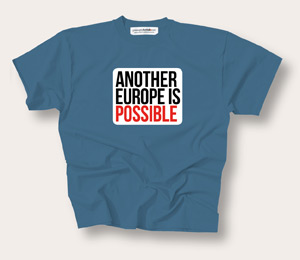
Ireland Always Rising
14.03.16
For St Patrick’s Day Mark Perryman outlines the meaning of the forthcoming Easter Rising Centenary for models of Britishness
 St Patrick’s Day. Down the local, one of the best night outs of the year, a non-stop party drenched in all things Irish. A celebration of Ireland’s freedom, which can never be entirely separated from history either.
St Patrick’s Day. Down the local, one of the best night outs of the year, a non-stop party drenched in all things Irish. A celebration of Ireland’s freedom, which can never be entirely separated from history either.
For decades it was Ireland that defined first the British Right, the Conservative and Unionist party remember, and then latterly the street-fighting Far Right too with their links loyalist paramilitaries and hatred of all things otherwise from Ireland. Today such connections are broken, the last remnants the unofficial insertion of ‘No Surrender’ into the National Anthem (sic) by a section of the football crowd at England internationals. No surrender? To what exactly.
But the framing of Britishness via its relationship to Ireland has to be accounted for by a range of factors beyond the narrowly political. St Patrick’s Day is emblematic of the complexity and contradictions. Britishness is far more accommodating and porous than it is often credited for. Beyond the body politic take music, popular literature, film and sport where a particular version of Irishness has been embraced. From punk icons Stiff Little Fingers to the Pogues, Sinead O’Connor and The Corrs via Hothouse Flowers and Sawdoctors to the mega-success of U2 this is a cultural insurgency that cannot be lightly discounted. Not so long ago North London’s Finsbury Park would be packed out for the two-day Fleadh festival with an extraordinary range of artists parading their Irish heritage. Glasgow’s Celtic Connections celebration today does something similar.
Roddy Doyle, particularly with his Barrytown trilogy of novels transformed for a generation what Irish identity might look like. Full of humour yet never losing sight of where they’d come from and what Ireland had been though to get there. In his recent work a more obviously political author Doyle has never though once lost his popular edge.
This summer, in the year of the 1916 Easter Rising Centenary, Northern Ireland and the Republic will both compete, together and independently of one another, in a major football tournament for the first time. At Euro 2016 there will be two ‘Green and White Armies.’ There’s some history here, not apart from the politics but affected by it, and shaping the political in return too. Northern Ireland made it to World Cup ’82 in Spain, with Martin O’Neill a star of the team who now manages the Republic. They were there in Mexico four years later too for World Cup’86. Then the Republic kind of took over, Euro ’88, Italia 90, World Cup ’94 , managed by Englishman Jack Charlton, one of the heroes of the England ’66 World Cup-winning team. Big Jack built an Irish team around finding players in the English and Scottish leagues who qualified for Ireland via parentage but previously had never thought of playing for the Republic. But notwithstanding the bending of who can and can’t ‘represent’ Ireland something more important was perhaps underway. As the troubles in Northern Ireland edged their way towards an unfolding peace process on the pitch and in the stands what it meant to be Irish and what Ireland might become was being transformed.
But there remain those who would prefer to rewrite their own history. Jeremy Corbyn and John McDonnell were on Labour’s back benches when the IRA’s military campaign was in full and lethal swing. They were amongst the few who at the time argued that what was needed was a political solution and this must include both a dialogue with those behind the bombing and the ending of injustices dished out.They were demonised as ‘terrorist sympathisers’ then. A Tory Party that seems to have forgotten John Major’s role in initiating the peace process is clearly gearing up to use those self-same smears now against a Labour Leader and his Shadow Chancellor some thirty years later.
In Irish politics meanwhile we have seen the emergence of the civic nationalism of Sinn Fein, first mostly in the North but increasingly in the South too, of course it goes without saying that Sinn Fein like all those committed to a United Ireland recognise no such border. An anti-austerity party that sits in the European Parliament with the European United Left alongside socialist and communist parties is a very different proposition to what might have been imagined was possible at the height of the Provos campaign in the 1980s. And in the 2016 Irish General Election alongside the election of Sinn Fein TDs anti-austerity TDs were also elected, while the Irish Labour Party continued its woeful decline, or Pasokification. Sinn Fein and the Anti-Austerity Alliance/People Before Profit alliance are not the same but what they do have in common is a militancy they claim as a shared inheritance from Easter 1916.
A centenary is an excuse, of course, for looking back and that search for meaning is always contested, or at least it should be. We should be able to account for the cultural shifts in how Irish national identity is shaped, the politics of Sinn Fein and others’ civic nationalism understood while the factors that created the conditions for a political solution in place of a military strategy perhaps in these troubled times demand the most careful revisiting of all.
This year’s St Patrick’s Day for many will be the prelude to the Easter Rising Centenary celebrations just a week and a bit later. The connections between the popular culture of a night out and a political legacy will never have been more obvious. Dublin today is a serious competitor to Barcelona and Prague as amongst budget airline travellers’ favourite European destinations for a city break, another instance of the connections between the cultural and the political. Many will visit O’Connell Street to take a snap of the iconic Dublin General Post Office. But of course this isn’t simply a splendid example of late Georgian architecture nor merely a handy place to post a postcard home. It was the HQ in 1916 for the men and women who fought in the Easter Rising. This is a rebel city, a rebel culture, a rebel country that was to break the Union. Ahead of the rising across the front of Dublin’s Liberty Hall, home of the Irish Transport and General Workers Union, a banner was hung ‘We serve neither King nor Kaiser but Ireland.’ This was the nature of that break, the cause of self-determination and independence. Yet as Fintan O’Toole has pointed out some quarter of a million Irishmen fought in the First World war on the British side and during the course of the Rising 570 Irish soldiers lost their lives on the Western Front following a particularly lethal German gas attack. So that breakage is complicated, it was partial and while some defined their nationalism as ‘my enemy’s enemy is my friend’ whatever their motives and intentions, others didn’t. And Irish Nationalism had its internationalist side too, the Irish volunteers who fought with the International Brigades in the Spanish Civil War famously called themselves The Connolly Column, their Irishness fusing with the cause of land and freedom. While others defined the cause of Ireland in terms of the purity of a particular version of Catholicism to side with Franco against the Spanish republic.
Today a faith-based politics is of decreasing importance in the modern Ireland as evidenced by the referendum vote in favour of equality in marriage for Lesbians and Gay men. It was James Connolly’s vision that ‘the Irish people will not be free until they own everything from the plough to the stars.’ It is this vision that more than anything should frame how we celebrate Easter 1916. As a very Irish moment when the human potential of freedom and equality was most evident and could never be extinguished whatever the scale and might of the forces ranged against it. To that all of us, Irish or not, should gladly raise a glass on Thursday night. Happy St Patrick’s Day!
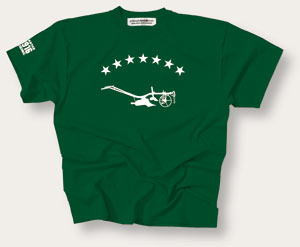 Philosophy Football’s Easter 1916 T-shirt range, 20% off until St Patrick’s Day quote coupon code Easter 2016 at checkout. The T- shirts are available from here
Philosophy Football’s Easter 1916 T-shirt range, 20% off until St Patrick’s Day quote coupon code Easter 2016 at checkout. The T- shirts are available from here
What is the point of the European Union?
01.03.2016
Sanjiv Sachdev of Philosophy Football reports on the launch ofGood Europe initiative
 Cold, winter Sunday evenings are not the most auspicious times to hold political seminars, yet this one was had a packed (and sleekly designed, Emirates funded) lecture hall of 400 people, with many more on the waiting list. In part, this was due to a panel featuring Yanis Varoufakis, the flamboyant and charismatic former Syriza finance minister of Greece– with the Guardian columnist, Zoe Williams and the Green Party MP Caroline Lucas.
Cold, winter Sunday evenings are not the most auspicious times to hold political seminars, yet this one was had a packed (and sleekly designed, Emirates funded) lecture hall of 400 people, with many more on the waiting list. In part, this was due to a panel featuring Yanis Varoufakis, the flamboyant and charismatic former Syriza finance minister of Greece– with the Guardian columnist, Zoe Williams and the Green Party MP Caroline Lucas.
The event was organised by the think tank Compass. The chair of Compass, Neal Lawson, opened the event with an eloquent summary of the ‘Brexit’ stakes – much higher than petty personal political ambitions of Boris Johnson and the spurious last minute deals of Cameron. Beyond the urgent need for European cooperation to tackle climate change, the spectre of global financial meltdown and pressing issues of migration and xenophobia, Neal contended that the referendum, like the Scottish one before it, offered an opportunity to re-imagine the kind of Europe we want. To this end Compass is seeking to build a network of activists, campaigners and politicians against Brexit and for a ‘Good Europe’ on June 23rd.
Caroline Lucas, who has an ability to articulate complex, sometimes dry, issues in a clear, vivid style, urged the widening of horizons – to examine what kind of people we are and what we want for our children, denouncing the narrow, dismal, dreary transactional view of the EU proposed by Cameron and instead arguing for an EU with sustainability and social justice at its heart. The latter could be the EU’s new ‘big idea’, as the former binding ideas of peace on the continent lose their potency and appeal. This would include an EU that was a global leader on renewable energy, that tackled wealth inequalities and fuel poverty – closing the gap between rich and poor (she noted that the Structural funds, if used imaginatively, provide the basis of such a redistributive mechanism). Caroline was well aware of the EU’s flaws but also recognised its positive potential – thus while corporations do wield far too much influence, the EU also led the world in the Paris climate change talks. She noted that the much criticised TTIP, would not be any better in a Cameron-led government bilateral negotiation – many of its more pernicious provisions were ones that his government either instigated or supported – leaving the EU would not improve trade policy. However, the need for greater accountability and transparency continued to be pressing. The EU needs reform but the main challenges we face today – from climate change, refugees, financial regulation and terrorism – continue to be cross border ones.
Zoe Williams also sought to shift our focus to what Europe could be rather than what it looks like now. She wanted us to imagine what a ‘good Europe’ would look like (citing Adorno’s maxim that we should discover not the past, but the dreams of the past) – seeing nascent signs of hope in the growing bonds between refugee charities and green groups. Zoe contended that the ‘Leave’ campaign had alienated broader discussion by its arcane focus on tedious intricacies and toxic untruths. She noted that ‘big dreams’ underpinned the EU – that of trade bonds displacing those of war. Moreover, the benign impact of the EU on matters like the environment and workers rights are tangible gains that need to recognised and celebrated – they would not have come from a UK government. The EU Commission’s proposals for refugees were far more humane than that of national governments, especially governments like that of Britain’s.
Academic Mary Kaldor warned of the return of fascism and war if the EU did disintegrate. Moreover, the EU role and capacity of taming globalisation in a globalised world will be neglected in the Brexit debate. Cross national entities are needed to deal with cross border problems – otherwise you have an unfettered globalised world.
Yanis Varoufakis entered the debate with a combative flourish. He contended that the EU was in an advanced state of disintegration – developing into a post-modern version of the 1930s, with borders being resurrected and the Euro fragmenting the EU economy. He drew parallels between the debt-fuelled crash of 1929 and its 2008 successor and the ‘clueless’ responses to both by European governments, as well as the past and current rise of the Far Right – strikingly evident now in Hungry, Poland, Greece and France but elsewhere in Europe too. Yanis called for an alliance of the Left, Liberals and Greens to fight this rising rightward tide – what the 1930s generation failed to do. The Democracy in Europe Movement 2025 (DiEM 25) launched earlier this month by Yanis seeks to reinvigorate the idea of Europe as a union of people ruled by democratic consent rather than by technocratic edict. This would seek to meet the challenges of the refugee crisis, climate change, the dearth of investment on a European basis, not a national one – the ‘cocoon’ of the nation state would be insufficient. But DiEM also sought to answer a question posed by the Right on the issue of sovereignty and legitimacy with greater democracy – the former model of economic integration leading to political union was no longer sufficient to this end.
In the subsequent discussion Caroline said that the Left should not be defensive in the Brexit debate; it was intriguing that the Right had no objection to pooling sovereignty when it came to NATO, TTIP or the WTO (World Trade Organisation) but raised hackles with the EU – and that we are going to be stronger if we work together. She noted that Sovereignty was a hollow thing if you have no power – to have influence you need to pool power for the common good. Yanis Varoufakis denounced Cameron as a politician of ‘no substance’ with his recent EU deal being characterised as ‘the mother of all Euro-fudges’; he characterised the Leave campaign as a ‘Burkean frenzy’ that wants to be part of the single market and engage in free trade – yet the former (as Norway and Switzerland know) requires adherence to common standards (environmental, labour etc) – ultimately a single market needs a single sovereignty. For him, the disintegration of the EU will accelerate unless greater democracy is injected into its workings. To this end DiEM would seeking to convene a constituent assembly from across Europe. Zoe was scathing as to the coarseness of the EU debate – in part due to an irresponsible right-wing media – with its demonology of faceless bureaucrats and hyper-fertile, lazy migrants. She addressed the issue of creating a common European identity as a counter to the inward turn of many national parliaments; the EU was the ‘only bastion of partial defence’ in a globalised world. Lucas ended with an elegiac, adapted quote from Arundhati Roy for a pan-European movement: ‘Another Europe is not only possible, but she is in her on her way, and on a quiet day I can hear her breathing’.
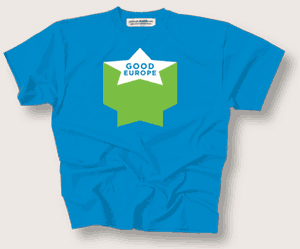 Philosophy Football’s Good Europe campaign T-shirt is available from here
Philosophy Football’s Good Europe campaign T-shirt is available from here
23.06.16 Fixture Clash Euro 2016 Football vs Euro Referendum 2016
22.02.16
When Euro 2016 clashes with the European Referendum this summer Mark Perryman ofPhilosophy Football reckons he knows what the final score will be
 David Cameron, you know the one who gets his Villa’s and West Hams all in a muddle when professing his undying love for a team in claret n blue, obviously wasn’t checking the summer fixture lists when plumping for a date to have a Euro Referendum.
David Cameron, you know the one who gets his Villa’s and West Hams all in a muddle when professing his undying love for a team in claret n blue, obviously wasn’t checking the summer fixture lists when plumping for a date to have a Euro Referendum.
Not content to pee off the Scots and Welsh with a vote a few weeks after their 5 May elections, and Londoners too who vote for a Mayor on the same day Dave has also chosen to clash with football’s European Championships. And not only this summer time round will much of England be transfixed on the tournament but with Wales and Northern Ireland qualified three ‘home’ nations will be there together at a Euro or World Cup for the first time since World Cup ’82, more than thirty years ago. In anybody’s book this is an historic achievement likely to spur huge popular interest, woe betide any canvassers, from either side, who interrupt those with eyes, ears and emotions transfixed on the TV for the games. The TV schedules for debates will have to be arranged not to coincide with games. Big rallies on any night our teams are playing will have row after row of empty seats .
Just as the argument, in or out, reaches the proverbial fever-pitch a decent chunk of the English, Welsh and Northern Irish population (with the Republic qualified too both communities over there) will be maxing out their interest in all things European. And the Scots? Cheering on anyone but England, naturally!
This could be a fascinating mix. Those papers trumpeting get out of Europe on the front pages breathlessly reporting on results from being in Europe on the pitch splashed across the back pages.
Such a football vs politics fixture clash has some form beyond canvassers having doors slammed in their faces because they’ve interrupted a household watching a match on the TV.. In ’66, Wilson won a Labour landslide just ahead of England winning the World Cup and promptly draped his early version of Labour modernisation, the white-hot-technological variety, in all things football and Beatles More than a generation before Blairism’s Cool Britannia Harold’s ‘Have you ever noticed England only ever win the World Cup under a Labour Government’ is surely the definitive football-politics soundbite.
Four years later Wilson decided not to call a General Election until after the Mexico ’70 World Cup fully expecting an England team many considered to be better than the ’66 squad to retain the trophy. They didn’t, losing 3-2 to West Germany in the quarters. A team that was past it’s glory days, a country looking for something different after six years of Labour. Edward Heath, a yachtsman not not a football fan, led the Tories to victory.
In 1988 Jim Sillars scored a sensational by-election win for the SNP but lost his seat at the following 1992 General Election. This was in the midst of an era when Scotland qualified for Euros and World Cups including Italia ’90 and Sweden ’92. The Tartan Army were everywhere but no SNP breakthrough as a result. An angry Sillars derided the supporters as ‘ ninety-minute nationalists’. Now we have the obverse, no Scots team has qualified for a tournament since World Cup ‘98 , the SNP’s support never greater. Ninety-minute nationalism? The commitment is so all-consuming it seems like the Scots barely have time for the football.
In ’96 England hosted the European Championships. When England made it through to the semis (look away now if the score and manner of the exit is too painful to watch) there are well-substantiated rumours John Major considered calling a snap General Election if England should win the tournament and kill off new Labour before it was too late. A semi-final defeat to Germany, on penalties put paid to that idea.
Not to be outdone Blair wrapped his 1996 Labour Conference in the opportuity he believed Euro ’96 had carved out for new Labour:
“Labour’s coming home! (Applause) Seventeen years of hurt never stopped us dreaming. Labour’s coming home! (Applause) As we did in 1945 and 1964, I know that was then, but it could be again – Labour’s coming home. (Applause) Labour’s coming home.”
Cringeworthy doesn’t even begin to do those words justice. Still, it didn’t seem to do Blair very much harm and the rest is history.
And so history sends us rather mixed messages about Euro football vs Euro Referendum fixture clash. The most likely outcome will depend on which campaign has the best popular vision to project the meaning of Europe. So far the signs are dismal from both camps, in fact the entire commentariat, not to mention Cameron himself, appear to have entirely missed the clash of dates, and these people call themselves well-informed, in touch?
My vision of Europe is rooted in popular culture not the Westminster bubble politics of which self-serving Tory is stabbing another self-serving Tory in the back. National teams competing against one another, an expanded competition to recognise the new Europe, the free travel and mixing of fans and fan cultures, at home with our own ways of supporting our team, excited to take these on our travels away too. And UEFA, or FIFA? Not much love lost between us and them, institutions in dire need of reform but we’re not walking away from the need to change them either. Europe as a place we can call home when we want to, abroad when we don’t.
And the final score? If England, Wales and Northern Ireland combine to disappoint I wouldn’t count on support for staying in Europe doing very well as a result. But as I expect England to top their group, Wales come second, Northern Ireland stage an upset or two, France 2016 could prove to be one big party of being part of Europe not apart from. Never mind the establishment campaigns, instead then expect a populist wave of Euro-enthusiasm to sweep Yes to victory.
Mark Perryman is the co-founder of the self-styled ‘sporting outfitters of intellectual distinction’ aka Philosophy Football. His new book on the 50th anniversary of England winning the World Cup, 1966 And Not All That will be published in May by Repeater Books
Football's Unholy Trinity
16.02.16
After the recent ticket price protests Mark Perryman of Philosophy Football makes the case for rebuilding the fabled ‘people’s game’ from below
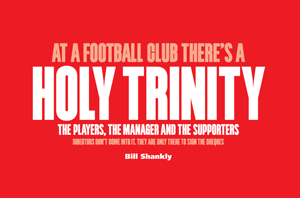 My favourite ever quote about politics is from Marx, "All that is solid melts into air, all that is holy is profaned.” Spookily for a professed agnostic I find the word ‘holy’ also features in another favurite quote, this time from another 'red', Bill Shankly, that made a reappearance during the Liverpool fan ticket price protests. “At a football club, there's a holy trinity - the players, the manager and the supporters. Directors don't come into it. They are only there to sign the cheques." Apply Marx’s dictum to modern football, Liverpool, virtually any other Premier League club and a decent chunk of the Championship and below too, the scale of the profanity is off the satanic scale. As for Shankly’s trinity not much of it's holiness remains either.
My favourite ever quote about politics is from Marx, "All that is solid melts into air, all that is holy is profaned.” Spookily for a professed agnostic I find the word ‘holy’ also features in another favurite quote, this time from another 'red', Bill Shankly, that made a reappearance during the Liverpool fan ticket price protests. “At a football club, there's a holy trinity - the players, the manager and the supporters. Directors don't come into it. They are only there to sign the cheques." Apply Marx’s dictum to modern football, Liverpool, virtually any other Premier League club and a decent chunk of the Championship and below too, the scale of the profanity is off the satanic scale. As for Shankly’s trinity not much of it's holiness remains either.
Recently the Premier League made a big deal of their rebranding. Call me old skool if you like but I date the start of the profanity to when the First Division became the ‘Premiership’, complete with super Saturdays and Sundays. Swiftly followed by the farce of a Division Two becoming ‘The Championship’ and the ludicrous renaming of Divisions Three and Four as Leagues One and Two. When marketing tramples on language to this scale something is seriously amiss. Language is power, it’s rewriting for the most spurious of ends will only end in something rotten.
So you’ll forgive me if I didn’t celebrate the Liverpool fans’ ‘victory’ over the £77 top price tickets in Anfield’s new stand with quite the gusto of some. This is nothing to do with club rivalry, well done to those Liverpool fans. But for all the their agitation the result is simply the preservation of the status quo - an over-priced game. The only substantial difference achieved was a favourable public relations gloss for the owners replacing the hitherto unfavourable one. Just a moment or two on a calculator reveals the scale of the hoodwinking going on. 1,000 tickets free to local school kids over the course of a season amounts to some 0.2% of all tickets that will be sold. 10,000 tickets at £9 total 2%, another 20,000 tickets at reduced prices for 17-21 year olds another 4%. It’s a tiny minority of those sold at higher prices, one that becomes even smaller when Cup and European games are factored in. A sop. Meanwhile those fans who walked out on the totemic 77th minute were barely a quarter of those at Anfield.
As fans there’s a collective indulgence in a different version of the misuse of language. ‘We had a decent result against XYZ Utd.’ There is no trinity anymore of the kind Shankly was describing, and thus no such ‘we’. The fans represent a community of interest of course. But players move on at will, managers too, taking their entire backroom staff with them, club strips change every season complete with shirt masker and sponsor dwarfing the club badge, which, ignoring any sense of history, frequently changes too. Historic grounds move, changing their name as well with the sale of stadium naming rights. Owners buy and sell clubs at will to the highest bidder. So who’s this ‘we’?
The ‘we’ is the constance of our support, meanwhile as Marx predicted everything else solid melts away. No, fans are not customers, nor are we consumers in the traditional sense. But that has hardly served our interests any better as a result. We won’t switch our loyalty and support to the other lot down the road because their tickets are cheaper, the sightlines in their stadium better, they play a more attractive or successful type of football. So ‘our’ club can do almost anything they want and nothing very much changes. For all the huff and puff on 5 Live’s 6.06 radio phone-in, there is no meaningful debate to effect any change to a steadily worsening situation. At the same time the leverage fans might have is steadily reduced as the percentage of our club’s income from the tickets they sell us gets smaller and smaller.
Despite all this there are plenty of instances that continue to make me proud of our football and provide me with a pride to call myself a fan. But they exist almost entirely outside the mainstream game. Just a few examples from the past few weeks that barely got a mention alongside all the media coverage of those Liverpool fan protests. Dulwich Hamlet anounce the hosting of a friendly match vs FC Assyria to raise funds for refugee charities. Football Unites Racism Divides in Sheffield are organising a festival to celebrate the women’s game. The ongoing militant anti-homophobia of the Clapton and Whitehawk Ultras. The growth of fan internationalism via the Glasgow, Yorkshire, London and other St Pauli Supporter Groups. The contunuing growth of the community ownership model of my club Lewes FC and plenty of others in non-league including, most famously FC United. The wildly ambitious efforts of Hackney Wick FC to create a club from scratch rooted in community action. The work around diversity of the much-maligned FA, most recently their Disability Talent ID day organised by County FA’s across England. The latest Kick it Out Raise your Game event to extend the diversity of football’s workforce. The superlative practical contribution via coaching and mentoring of Football Beyond Borders.
This is football from beyond Shankly’s now broken holy trinity. It goes on mainly unheralded enjoying a relative autonomy from the business culture that dominates the modern game. None of it would exist without the broader platform football provides yet not much of it is shaped by what the mainstream game has become either. Hence the ‘relative autonomy’ of my lexicon of Marxist analysis. It is a relationship shaped by class relations. In Shankly’s era his holy trinity was founded on an essentially common experience – fans, players and managers - framed by a working-class game. The money men, the local business elites of the butcher, baker and candlestick makers always had the ambition to divorce football from its origins. But the localism of football culture set limits to the scale of the disconnect they could effect. This is in essence what those Liverpool fans were seeking to defend. Not a ‘people’s club’ as such but at least a local club. It is the replacement of local business elites as owners by the global business elites of speculators, oligarchs and sheikhs that has massively accelerated the process of disconnection, it’s what turbo-capitalism does.
These various efforts outside the mainstream of football project an entirely different vision of what football might become. They are rooted in the values of the ‘people’s game’ yet are sensitive to the changes in class relations as much as patterns of ownership. Hence the centrality of issues of race, gender, sexuality and disability. There is a popular internationalism characterised by an affinity with the inter-cultural influence of resistant fan cultures wherever and whenever. And above all punk do-it-yourself ambition, if the owners of our clubs are going to make such a spectacular mess of running our clubs why not just run them ourselves.
There is of course a danger in over-stating the achievement of this other football. It remains a minority movement. But this is how almost all radical change has started. Initiatives that exist at the margins of the mainstream. Power relations after all seek to marginalise women, black, lesbian and gay, refugee, disabled and working-class communities for a reason. Key to these various responses are their challenge to this marginalisation as part of remaining loyal to Shankly’s ‘holy trinity’. In this sense they are as much about reinvention as reclamation. Football from below. It’s an idea whose time has come.
Mark Perryman is the co-founder of the self-styled ‘sporting outfitters of intellectual distinction, aka Philosophy Football. His new book 1966 and Not All That is published in late April by Repeater Books.
Hope vs Fear is match Another Europe campaign launch looks forward to
11.02.16
Sanjiv Sachdev reports for Philosophy Football on the practical idealism a new campaign is offering ahead of the Euro Referendum

A chilly February evening, in a packed hall, with a glitterball ceiling more accustomed to beery gigs and dancing, saw the launch of Another Europe is Possible with a broad range of speakers proffering support for a different kind of European Union. The launch was devoid of the dry, technocratic jargon and stale, cold language of narrow self interest, that so disfigures and stifles debate about the EU. Instead, it proposed a people centred Europe, a Europe based on hope rather than fear; a European Union with social and environmental justice at its heart. It proffered a confident, outward looking Europe rather than an inward looking Britain – one that recognised that working with others was likely to be more effective than doing things on our own.
There was a strong recognition that the EU is seriously flawed with deep democratic deficiencies and a myopic, destructive economics that has inflicted much misery but nevertheless in a globalised world it offered the potential for tackling climate change, strengthening worker rights, fighting corporate tax evasion and dealing with the refugee crisis – summed up in the campaign’s slogan‘stay in Europe to change Europe’. Many speakers expressed a sense that Brexit would entail a further shift to the right, that narrow nationalism would erode the protections and rights that have been won in the EU, and that, for all its flaws, leaving the EU would make matters worse. Some also noted that there may be a very short timetable - little more than four months (June 23rd) - before the referendum is held.
The range of speakers was wide - Asad Rehman, from Friends of the Earth, Marina Prentoulis from Syriza UK, three MPs Caroline Lucas (Green Party), Stephen Gethins (SNP), Hywel Williams (Plaid Cymru), Syrian refugee and PhD student Mohammed Ateek, striking Junior Doctor, Janna Bowen, Labour Party activist and writer Michael Chessum, from the NUS Sahaya James and Save Lambeth Libraries campaigner Ruth Cashman.
A series of alternatives was evident in the contributions from many of the speakers; a Fortress Europe against an Open Europe, a neo-liberal Europe versus a social Europe, a business centred or a people centred Europe, the solidarity of peoples or the divisions of nationalities, an unaccountable Europe or a democratic Europe, the freedom of movement versus the freedom of capital.
The stand out speaker was the Green Party MP (and former MEP) Caroline Lucas. She made clear the desperate, dismal, dreary paucity of Cameron’s deregulatory vision of Europe, that he was the most ardent advocate of the Transatlantic Trade and Investment Partnership (TTIP), but that leaving the EU would not lead to a more benign trade policy. The fact that the stronger regulation of bankers was an issue that particularly provoked his ire was telling. In the Paris climate talks, Caroline noted that the EU had raised the environmental standards of countries like Poland. She argued for a Europe in which every EU country had a minimum wage; that the idea of a basic income should be explored in every EU country and that a new economic model be pursued – one that recognises that the planet has finite resources. Moreover, she criticised the ‘Stronger In’ campaign for not having values based arguments, but for instead pursuing a narrow, instrumentalist approach. Finally, she felt that we should not neglect the ‘peace dividend’ of the EU - that before the EU the continent had been riven with conflict and that now, be it ever so cumbersome, differences were dealt with by discussion and debate – a far better option.
The biggest welcome of the evening though was for striking Junior Doctor Janna Bowen. She noted that a fifth of all new doctors are from the EU – of her seven colleagues, five came from the EU. EU workers are vital to the NHS. She also noted the positive impact of the Working Time Regulations – which brought in protections to stop tired doctors making mistakes - and the greater pool of scientific resources when EU countries work together.
Many other issues were issues by the panel and the audience. These included the implications of the leftward shift in Portugal, Spain and Greece; the curious bedfellows emerging in this debate – such as Plaid Cymru finding itself in the same voting lobby as the Ulster Unionists; the dilemma posed if England votes to exit and Wales and Scotland vote to remain; that the mainstream ‘In’ campaign looks like the establishment and is run by establishment; the EU’s positive role in introducing regulations tackling the sewage on our beaches and the air pollution that blights so many cities and damages so many lives. One audience member, a young Polish migrant worker raised the virtues of the freedom of movement and how concerns over issues of security of employment had spread from British trade unions to the Polish diaspora. Speakers contended that we would still shaped by laws that we could no longer influence’; the dangers of post-EU ‘race to the bottom’ economics were noted, further weakening worker protections and diluting environmental safeguards.
The event concluded with some final thoughts from the panel. For all the virtues of Facebook and Twitter – in many ways, they preach to the converted - the importance of looking outwards and talking to people was a lesson from both the current doctor’s dispute and the Scottish referendum, in essence, the revitalisation of grassroots campaigning. Constructing a coalition of disparate voices but around some common aims seemed to characterise the event – one that humanised an ‘In’ campaign, where the abstract can lead to apathy. A campaign based on hope rather than fear is always the more appealing prospect.
Note Philosophy Football’s Campaign T-Shirt Another Europe Is Possible is just £9.99 and available from here.
Yanis Varoufakis launches Democracy in Europe Movement DiEM25
10.02.2016
Phil Butland reports from Berlin forPhilosophy Football
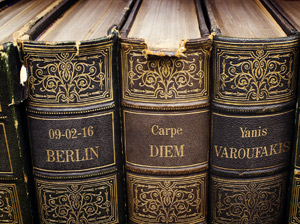 Former Greek finance minister Yanis Varoufakis launched his Democracy in Europe Movement (DiEM25) on 9th February at the Volksbühne theatre in the centre of Angela Merkel’s Berlin. Promising a message of hope to “people who don’t believe in politics”, he spoke of a broad transnational movement aimed at democratising Europe before it disintegrates. “If we do nothing”, he said “we’ll return to the 1930s”.
Former Greek finance minister Yanis Varoufakis launched his Democracy in Europe Movement (DiEM25) on 9th February at the Volksbühne theatre in the centre of Angela Merkel’s Berlin. Promising a message of hope to “people who don’t believe in politics”, he spoke of a broad transnational movement aimed at democratising Europe before it disintegrates. “If we do nothing”, he said “we’ll return to the 1930s”.
Accompanying Varoufakis on the podium were political leaders and intellectuals from the broad left, including German LINKE leader Katja Kipping and Podemos MEP Miguel Crespo Urban to Croatian philosopher Srecko Horvat and British artist-musician-activist Brian Eno. Joining by video link were the mayor of Barcelona Ada Colau, US economist James K Galbraith, Wikileaks founder Julian Assange and Slovenian intellectual Slavoj Zizek.
Varoufakis stressed his belief in a genuinely broad movement: “I am proudly Left but DiEM25 is more than that. Neoliberalism has made social democracy impossible. I ask all democrats, social democrats, liberal democrats: can you live with this`? We are radical in a way that liberal democrats must be if they are to survive.”
Place was also allowed for dissenters from Varoufakis’s project. Veteran German SPD MP Gesine Schwan was introduced as the only member of the German government who had offered any support to Varoufakis when he was in office. Schwan said: “I won’t be part of the movement, but I don’t want to calm the enthusiasm”. She agreed that the financial crisis was the start of destroying democracy in Europe, and offered to cooperate on future projects.
DiEM25 has launched an initial manifesto on www.diem25.org with four main principles:
· No European people can be free as long as another’s democracy is violated.
· No European people can live in dignity as long as another is denied it.
· No European people can hope for prosperity if another is pushed into permanent insolvency and depression.
· No European people can grow without basic goods for its weakest citizens, human development, ecological balance and a determination to become fossil-fuel free in a world that changes its ways – not the planet’s climate
The Website also calls on “our fellow Europeans to join us forthwith to create the European movement which we call DiEM25”. It is, at the moment, still somewhat vague about what this movement is to do. This was noted in the brief round of questions at the end of the launch. A number of speakers from the floor asked “where do we come in?” and “how do we get from A to B?”
Democracy Deficit
From the wide range of different speeches in the Volksbühne, there appears to be consensus on two main things – the need to address the current deficit of democracy in Europe, and the need to reform the EU.
Regarding democracy, Varoufakis compared the European Union to the Soviet Union, where initial hopes of liberation were replaced by a faceless bureaucracy. According to Srecko Horvat “the dream of the marriage between capitalism and democracy is over. We saw that last year with SYRIZA”.
Horvat argued that when we try to understand how we have reached the limits of this democracy deficit, we should not just blame the failures of SYRIZA. The European left as a whole also failed to build effective solidarity. A single election victory in one country was never going to be sufficient – even the occupation of every square in Europe would not be enough. What is needed is a common transnational movement that challenges power in every country.
At the moment, DiEM25 seems to be prioritising the struggle for democracy over more radical campaigns against neo-liberalism. Varoufakis says that he has friends and close collaborators who could be called Thatcherites or neo-liberals, and that even they would sign up to his appeal for more democracy. This may work for the short term, but some time down the line, DiEM25 must confront the question as to whether neo-liberalism is the cause or the effect of the democracy deficit.
Criticism of the current EU
All speakers criticised the current EU, with British Green Party MP Caroline Lucas making the point that the discussion about the EU carried out by DiEM25 was quite different to the debate in Britain. The British debate is generally polarised between David Cameron’s vision of a Europe based on division not solidarity versus the little Englanderism of UKIP. As a former MEP who served 10 years in Brussels, Lucas said that she had no illusions in the EU, but that the solution is reform.
Varoufakis noted the “pivotal year” of 2015, when the EU “quite substantially” failed with an economic policy that condemned large parts of Europe’s periphery to permanent poverty. After the Greek government was forced to capitulate, it had to spend massive amounts of money bailing out banks. In contrast, European governments are squabbling about a fraction of this amount being used to help refugees.
Podemos MEP Miguel Crespo Urban called for an end to the corporate power in Europe and Brussels, saying that EU secret agreements like TTIP show that the EU is in the control of corporate power. Cynical EU institutions are building higher walls against refugees while using debt as a weapon to blackmail the people of the South. Events last year in Greece showed how banks, not tanks, can be used to stage a coup d’état.
Ada Colau expressed her shame that refugees are suffering from the effects of a Brussels coup d’état in Greece. She called for a fight for a democratic Europe based on the support of people from the bottom up. She said that Europe can be Europe again if it’s put in the hands of its people. On that basis we should be prepared for a long fight.
Other speakers seemed to have greater illusions that the EU can be quickly reformed. According to former Portuguese MEP Rui Tavares, only the change of 2 or 3 laws would have the EU working democratically. Yet if the other speakers are correct it is difficult to see how the current power imbalance can be overturned so easily
Tavares noted that at the moment half of the centre-left is sitting in neo-liberal governments, while the other half is “helping the far right to leave Europe”. This idea that saying that the EU is irreformable plays into the hands of the racists was reiterated by several speakers, including Slavoj Zizek who warned against “the return to strong nation states”.
Yet the demand that we choose between EU reform and strong states is anargument which is predicated on the idea that the EU ever operated in the interest of its citizens rather than European big business. As Julian Assange put it “After World War Two there was a dream for what Europe could be, and this dream has been lost”. There remains the question as to whether this dream was ever realised in the EU.
One of the biggest problems confronting DiEM25 will be developing an analysis of exactly how its central aim of reforming the EU can be won, and what a reformed EU would look like.
Movement, not a party
Varoufakis stressed his belief that “the model of national parties is obsolete. DiEM25 should have no hierarchies, we are horizontal.” This is a laudable aim. It is though somewhat unclear how this will work in practice.
Every effective movement requires people who take organisational responsibility. Often the attempt to avoid hierarchies has led de facto power being in the hands of a few individuals – a charge often made against Pablo Iglesias’ Podemos.
Associated with the issue of movements and parties is the one of what DiEM25 should actually do. Independent Irish MEP Nessa Childers raised the question of whether we need power and, if so, what kind of power? She asked if DiEM25 should stand candidates in future elections, acknowledging that although these questions do not need to be answered immediately, DiEM25 must address them if it is to have a permanent future.
Similarly it is unclear how the movement will remain broad and radical. The presence on the podium of many Greens was a sign of the proposed diversity. Yet where the Greens have entered office in Europe their record has been generally quite rotten. This was acknowledged by Cecile Duflot, president of the French Greens and a former minister in Francois Hollande’s neo-liberal red-green government.
Duflot eventually left this government, but other Greens throughout Europe remain in office at national or local level. Gesine Schwan also noted her disappointment that Germany’s Social Democratic Party is in a coalition government with Merkel, and is supporting and implementing austerity politics. When DiEM25 comes into conflict with these governments, will its centre be able to hold?
Getting from A to B
DiEM25 has drawn up a timetable of immediately demanding full transparency in EU decision making, and using existing institutions and EU treaties to address the ongoing economic crisis within the next twelve months. It demands that a European Constitutional Assembly be set up within 2 years, whose decisions should be enacted by 2025 (hence the name DiEM25).
The first demands of the movement are live streaming of all EU meetings and the publishing of all their minutes. In the medium term, DiEM25 will organise a series of discussions to develop policy proposals to stabilise debt.
Alongside these general demands, DiEM25 members will also be involved in specific campaigns. Caroline Lucas made a list of demands including a European Green New Deal, energy efficiency, a minimum wage in each country, a European basic income, and a challenge to the idea that all problems are solved by economic growth.
Gerardo Pisarello, the deputy mayor of Barcelona spoke of the real gains that have already been made by the left-wing municipal governments in Spanish “rebel cities”. Although these governments only took office 8 months ago, they have already won moderate victories by uniting with movements for refugees and against evictions. Pisarello called for better cooperation of rebel cities throughout Europe.
Podemos MEP Miguel Crespo Urban also emphasised the importance of grassroots movements. He recently visited an initiative welcoming refugees in Moabit, a working-class area of Berlin. He said that despite media reports, it was such initiatives which were really helping refugees, not the Merkel government. He went on “we are coming from the social movements, from the people in the streets and the squares. We can never forget that.”
A number of other speakers also mentioned refugees and the responsibility of Western warmongering for the refugee “crisis”. At a press conference in the morning, Varoufakis explained “when someone knocks on our door in the middle of the night and they’re wet and hungry you don’t do a cost-benefit analysis.” Caroline Lucas made it clear that the resources are there to provide help: “never ever believe them when they say there’ no money for what we want them to do. They can always find money for wars and nuclear weapons”
Anna Siedle from the German anti-capitalist “Blockupy” movement talked of planned mobilisations in Berlin in the Autumn and international demonstrations before next year’s German national elections protesting against Germany’s domination of Europe. Hans-Jürgen Urban, Executive member of the IG Metall union, also emphasised the special responsibility of the German left and trade unions in fighting Merkel’s austerity government.
What now?
Varoufakis seems to be convinced that the simple demand of live streaming EU meetings and publishing minutes could be enough to break down the whole façade. He was supported here by Zizek, who said “demand something relatively modest, no-one can be opposed to it. But if you take this demand to the end everything falls apart. We just need the iron will to follow this demand to the end.”
Backing up these demands, DiEM25 has a timetable for the next 1-2 years. Varoufakis promises policy initiatives every 2 months, backed up by town hall meetings and meetings in theatres like the Volksbühne, leading to much bigger events. Quoting Dylan Thomas, he said: “DiEM25 is about not going gently in the good night. To rage, rage against the dying of the light”
It is still unclear whether this simple message will gain the necessary momentum, or how DiEM25 will cooperate with existing initiatives, such as the Plan B proposed by leading left figures in Europe around Oskar Lafontaine. Of course this does not mean that the attempt is not worth it. Srecko Horvat quoted Samuel Beckett saying “try again. Fail again. Fail better”. According to Horvat, our greatest enemy is not failure but passivity.
Addressing the idea that not all of DiEM25’s demands are fully-formed, Brian Eno said that this is a necessary component of making a step into the unknown: “We have strong feelings and need to make a bold step forwards. Start cooking – recipe to follow.” The full demands of what we want can only be developed in the process of the struggle.
One thing is sure – DiEM25 is not lacking in ambition. Varoufakis concluded his speech by warning that “the real danger is not aiming too high and missing but training our eyes on the floor. Tonight we’ll celebrate but tomorrow morning let’s shake Europe”.
NOTE : Philosophy Football’s Another Europe is Possible campaign T-shirt is now available just £9.99 from here
This is what a European looks like
08.02.2016
Mark Perryman of Philosophy Football makes a populist case for Europe
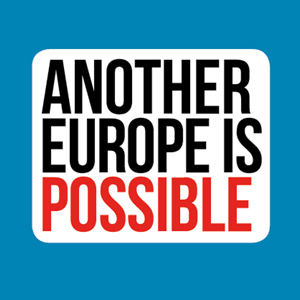 When I ask the question more often than not I am greeted with a sea of blank faces. ‘What’s the most Europeanised institution in British society?’ Easy! Easy! One-nil to me. Are we getting warm yet? Yes, a football club. From the owners and major shareholders, the management and coaching staff , via players on the pitch, youthful prospects training in the clubs’ academies, the competitions the clubs aspire to be part of, the shirt sponsors and pitchside advertising, the fans in the stands, the TV and wider media audience.
When I ask the question more often than not I am greeted with a sea of blank faces. ‘What’s the most Europeanised institution in British society?’ Easy! Easy! One-nil to me. Are we getting warm yet? Yes, a football club. From the owners and major shareholders, the management and coaching staff , via players on the pitch, youthful prospects training in the clubs’ academies, the competitions the clubs aspire to be part of, the shirt sponsors and pitchside advertising, the fans in the stands, the TV and wider media audience.
To win the debate on Europe, not that there’s much evidence of anything resembling a debate just yet, we need to entirely reinvent the terms of it. Football is as good a place to start that vital, and urgent, process as any other. Europeanisation of British football isn’t all good, of course. Foreign owners at the expense of supporter ownership. Domestic talent not getting a look in because overseas players and managers are too readily preferred. Global TV rights sold amounting to billions of pounds but ticket prices just keep going up, and up, and up. All of this is true but precious few fans would want to disconnect their football from Europe, and most would celebrate a decent proportion of the consequences of our national game going European as positives. OK it helps if you’re winning. When Newcastle supporters were basking in the success of their team’s French imports restoring the club to winning ways they famously renamed their favourite pre-match drinking hole The Strawberry, La Fraiche. Once the decline and fall returned it became all about those same French imports not having the stomach for a relegation scrap that true-born Geordies would have.
But look again at the bigger picture. Think how Cantona, Ronaldo, Vieira and Henry, Klinsmann and Zola have transformed English football, for the better, on the pitch. Wenger, Koeman, Martinez, in the technical area have immeasurably improved how the top-flight game is played. Who in Leicester this season would resent the fact that it is an Italian, Ranieri, in charge rather than their former manager, Englishman Nigel Pearson?
What can be said of football can to a large extent be said of the food we eat, the beer and wine that we drink, the fashion labels we dress ourselves in, the music we listen and dance to, the films and TV programmes we watch, the places we holiday in. British culture is increasingly Europeanised and most, if not all, are more than happy that it is. This is a popular internationalism, not of the solidarity with this, boycott that activist variety but every bit as, if not more, important. The question we should be asking is ‘What has Europe ever done for us?’ Plenty. And to those who retort, two world wars that’s what, it is Europe that both defeated the causes of both and since ‘45 has created the conditions to prevent a third one thankyou very much.
There is of course the issue of immigration, but in almost every instance this is raised there is next to no mention of emigration. Europe is a continent of job, education and lifestyle opportunities. To return to football as our conversation-starter. Instead of worrying so much about all those gifted foreign players wanting to come and play here we should be asking why so few of our players want to play abroad? The millennial generation will increasingly see Europe as their workplace, the place to study and train, a cultural common ground. Who are we to deny them that opportunity? Or is the Europe of the future only to be for those who can afford a French second home or a Spanish property to retire to?
What the in/out debate desperately needs is a popular vision of the Europe we want to become. A continent we are part of, not apart from. Britain as a European state like the rest of them not a so-called island race that patently ignores its history as a mongrel nation. Ironic really when 2016 marks the 950th anniversary of the Battle of Hastings and the Norman Conquest. And of course this is an island too that is on the verge of its own breakdown too. ‘Who shall speak for England’ the Daily Mail asks while on its back page the sportswriters regale the readers ahead of rugby’s Six Nations with how much they hate the Scots, and vice versa. What was once only true on the pitch is now absolutely the case off it. Not the fired-up rivalry in the stands but a political division as the dawning realisation that Scotland and England are two separate nations takes root in the body politic. And once Scotland breaks away, as in every meaningful sense it already has, Britain no longer exists. ‘Who shall speak for England?’ Whoever decided that Englishness is somehow the most anti-European of the lot is as out of touch with English popular culture as only a campaign led by an octogenarian, failed Chancellor of the Exchequer climate-change denier could be. Perhaps he should ask his daughter from whiuch countries she gets all those tasty and best-selling recipes for pasta, paella, moussaka and coq au vin from?
Cosmopolitanism is what this debate is all about. To change all that is wrong with the institutions post-war Europe created we have to be in it. Only the cowardly walk away. Lawson, Nigel not Nigella, and their ilk want the kind of uncomplicated Britain that existed before the Beatles played Hamburg and changed the world, Celtic and Man Utd won the European Cup , the corner fish and chips shop were overtaken by home-delivery pizza joints and the mini was built and manufactured somewhere or other but certainly not here. Have France, Italy, Spain, Germany surrendered their culture, their language, their history at the expense of being European? Of course not. And neither have, or will, we. Do the Dutch and the Germans, the Spanish and Portuguese retain their differences via their rivalry. Absolutely, as no doubt we will continue to do so with France and just about everyone else the other side of the Channel. And do parties including Syriza, Podemos, Left Bloc, Die Linke campaign to change Europe for the better? Yes and so should the English, Scots, Welsh left too, as constituent parties of a wider European Left of great variety.
Our side is popular and cosmopolitan, modern and European. The other lot narrow and inward-looking, out of touch and ancient, stop the world the want to get off and can’t wind the clock back quick enough. Ours are values rooted in the present but with an eye and purpose on a better, European, future. We cannot rely on the referendum debate being framed in these terms. NigelsLawson and Farage vs Alan Johnson and Nick Clegg, these are yesterday’s men. One line-up of business leaders vs theirs reducing the argument to number crunching that few have very much faith in. Editors providing the anti-or pro case in papers that are read by fewer and fewer, trusted by less and less. For values and visions that matter we’ll have to look elsewhere, a Europe from below, together as Europeans of many different nations. Not out, but in to shake it all about. To the foundations if you don’t mind. Our single European currency a faceless institution or a banknote in our pocket. Don’t make me laugh. It’s a culture, for me its my football for others something else and we’re not giving it up for nobody. This is what a European looks like.
Philosophy Football’sAnother Europe is Possible campaign T-shirt is now available just £9.99 from here
'Don't Tell Him Pike!'
01.02.2016
Mark Perryman of Philosophy Football describes Dad’s Army as the most popular front of all
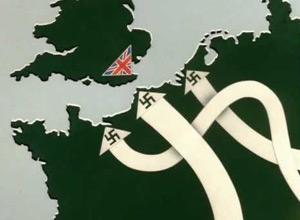 1968 was a tumultuous year. The Tet Offensive, the civil rights movement, the May events of ‘Paris, London, Rome, Berlin, We shall fight, we will win’ and the Prague Spring. This was also the year, 15th April to be precise, that Dad’s Army, unarguably Britain’s most loved TV comedy series, was broadcast for the very first time. Quite remarkably almost fifty years on never-ending repeats from the nine original series are still being broadcast as primetime Saturday night TV. Over Christmas a drama-documentary closely based on fact We’re Doomed : The Dad’s Army Story appeared on BBC, again in prime-time. And perhaps most amazing of all Dad’s Army has been remade into a new feature film, not reinvented for a 2016 audience but recreated to be as close as possible to the original version.
1968 was a tumultuous year. The Tet Offensive, the civil rights movement, the May events of ‘Paris, London, Rome, Berlin, We shall fight, we will win’ and the Prague Spring. This was also the year, 15th April to be precise, that Dad’s Army, unarguably Britain’s most loved TV comedy series, was broadcast for the very first time. Quite remarkably almost fifty years on never-ending repeats from the nine original series are still being broadcast as primetime Saturday night TV. Over Christmas a drama-documentary closely based on fact We’re Doomed : The Dad’s Army Story appeared on BBC, again in prime-time. And perhaps most amazing of all Dad’s Army has been remade into a new feature film, not reinvented for a 2016 audience but recreated to be as close as possible to the original version.
That very first appearance of the Walmington-on-Sea volunteers featured Jones the butcher sabotaging any threat of a Nazi invasion by reversing the road signs ‘To the town’ and ‘To the sea’ . Of course the result was obvious, a local motorcyclist stops, takes now the wrong turning and off camera there is a loud splash. A comedy classic has begun. It is easy to mock but a decisive connection is made via Dad’s Army with the Popular Front against Nazism which is ever-present amongst all the English slapstick humour. The Bank Manager, his hard-pressed Chief Cashier and the most junior of junior cashiers, the butcher, the miserabilist undertakerwho is an English coastline economic migrant from Scotland, the pensioner, the local ducker and diver, the vicar, the verger and their precious Church Hall, the busybody greengrocer. What brought them all together? The defence of Britain and all it meant to them from all that they feared Nazi rule would do in the name of hate. Only a few years previously Oswald Mosley and his British Union of Fascists was being cheered on by the Daily Mail ‘Hurrah for the Blackshirts’. Despite the best efforts of the stalwarts of Cable Street even in the autumn of 1939 after the declaration of war Mosley was still able to attract crowds to his so-called ‘peace rallies’ numbering in their thousands. The mood of appeasement remained ever-present spearheaded by the Tories’ Foreign Secretary, Lord Halifax. The middle-class , and very English, pomposity of Captain Mainwaring of 1940 is too easily confused with the nasty populism of UKiP 2016 but this is to seriously misunderstand and misrepresent what Walmington-on-Sea’s finest were all about. These were ordinary men (women, apart from Mrs Pike and Mrs Fox are almost entirely absent) doing extraordinary things and in the course of this reinventing what Britain could become. The selfless sacrifice of Mainwaring’s volunteers in the face of a Nazi Blitzkrieg that to date had laid waste to all resistance in its path is remarkable. In 1941 Hitler would launch Operation Barbarossa and do the same to any resistance in his way on the Eastern Front, until Stalingrad started the turning of the tide of course. The sacrifice is obvious in every episode, the heroism perhaps less so, although when a washed up U-Boat Commander tries to take over their seaside town Mainwaring’s epic order after the Nazi demands his young private’s name ‘Don’t Tell him Pike’ creates perhaps the show’s funniest moment of all. Never mind, the fierce and heroic resistance is obvious in Mainwaring’s voice and puffed up chest, no fascist was going to push old blighty around.
Of course class divisions remain within the platoon, as they did right across the war effort. But it is the public-school educated Sergeant Wilson who invariably loses out in the battle of will and leadership to the grammar-school educated Captain Mainwaring. It is however on the ideological front that in the fictionalised Walmington-on-Sea and the real Britain of 1939-45 a battle of ideas was being fought, and won. A popular mood of co-operation, the common anti-fascist cause and a wide recognition that a society led by and benefitting solely those most used to being in charge was no way to win either the war, or the peace. All of this created the basis for Labour’s 1945 landslide including the election of two Communist Party MPs, and the electoral defeat of Churchill’s Tory Party. We’ll never know whether the Walmington-on-Sea constituency went Labour, countless similar seats certainly did, but we can be sure that for at least a time the town wasn’t the place it was pre-1939.
There is a danger in dismissing the cult of nostalgia that Dad’s Army represented both in 1968 and in today’s version that we lose the meaning of that moment. Mainwaring, Wilson, Jones, Frazer, Godfrey, Pike & Walker were in their own way the most popular Popular Front of them all. Harking back to World War Two has created a peculiar version of English patriotism. The politics of anti-fascism are airbrushed out. The Labour victory in ‘45 despite Churchill’s wartime leadership scarcely mentioned. The Battle of Britain reduced to a football chant ‘Ten German Bombers and the RAF from England shot them down’ what kind of ill-informed tribute is that? World War Two memorialising becomes translated into a petty anti-Europeanism framed by a resentment at France ,and particularly Germany, but not Britain being the dominant forces in European politics. Dad’s Army gives us an alternative framework of understanding Britain then, and now. Unlike that other long-running BBC comedy set in World War Two Allo Allo the Germans rarely make an appearance and thus their fascism is never trivialised or turned into a misjudged excuse for a laugh. Mainwaring’s platoon are hopelessly funny but they are a joke. The opening credits spelt out what was at stake in 1940, Britain versus the swastika making its mark across Europe. This was an anti-nazi war not England vs Germany of ’66 vintage and ever since.
Dad’s Army was broadcast for 9 years, 1968-1977. Its ending pre-dates the rise and triumph of Thatcherism. It was under Maggie that Europhobia, or more accurately Germanophobia, came to define the Tory Right and would eventually create the basis for UKiP’s growth too. Given UKiP’s heartland support lies in England’s left behind coastal towns it is too easy to rewrite Walmington-on-Sea’s Mainwaring as Thatcher, or Farage, incarnate. But no, rather this was a platoon of community, common cause and if called-upon no little courage. You have been watching? The people vs fascism.
Philosophy Football’s 2016 range of Dad’s Army T-shirts are available from www.philosophyfootball.com
We can be Heroes
23.01.2016
Remember David Bowie but Mark Perryman of Philosophy Football argues with a purpose
 A cultural icon passes away and the routine of acres of newsprint, pullout supplements and memorial keepsakes follow in a mediated moment. What was it that Marx once said ‘All that is solid melts into air, all that is holy is profaned. The commodification of grief and loss creates a spectacle that amounts to wrenching the artist’s work out of any meaningful context their purpose denied the meaning that they intended. When David Cameron feels the need to share tales of surreptitiously listening to Bowie under the bedclothes of his Eton dormitory, the end of history surely beckons.
A cultural icon passes away and the routine of acres of newsprint, pullout supplements and memorial keepsakes follow in a mediated moment. What was it that Marx once said ‘All that is solid melts into air, all that is holy is profaned. The commodification of grief and loss creates a spectacle that amounts to wrenching the artist’s work out of any meaningful context their purpose denied the meaning that they intended. When David Cameron feels the need to share tales of surreptitiously listening to Bowie under the bedclothes of his Eton dormitory, the end of history surely beckons.
When Bowie sang that we could all be heroes, ‘we can be us’ just for one day he was celebrating a fundamental challenge to models of masculinity, gender and sexuality. The ever-changing Bowie was the most public of alternatives to rock music’s traditionally 1970’s macho culture, a popular internationalist equally at home in London, Berlin and New York, appreciative and understanding of each of these cities’ cultures and histories. He made us feel part of his world, not apart from it. Amateurishly daubing our own lightning flash across our faces, dyeing our hair and cutting it into a soulboy, or soulgirl, wedgecut, scouring the second-hand clothes shops to keep up with Bowie’s ransacking of fashion’s histories for his the latest change in how he looked and dressed.
Yes he had his off-moments. None more so when like too many artists he flirted with nazi-chic. It was a mistake that led directly to one of the most significant fusions of popular culture and protest in modern times , Rock against Racism. Bowie found himself on the wrong side of the argument but it was never where he belonged and he soon enough realised that.
Writer and cultural critic Suzanne Moore was one of the few mainstream commentators to sum up what Bowie at his best meant : “ That door. He unlocked it. For me, for you. For us. He gave us everything. He gave us ideas, ideas above our station. All the ideas and a specific one. Of life. The stellar idea that we can create ourselves whoever we are. He let us be more than we ever knew possible. There is nothing greater.”
There is a danger of course that this process of self-discovery results simply in an individualistic narcissism for adolescents, this is what pop culture back in Bowie’s peak years was founded on after all. The pin up poster on the bedroom wall, the fandom scrawled on the cover of a school exercise book, the latest release on the hi-fi . But to dismiss this and the resultant, for some, politics of identity as disconnected from social movements of change would be a profound misunderstanding .It was via these movements of feminism, gay liberation, black pride in the late twentieth century that politics was transformed to the evident discomfort of some pre-existing models of political change. Bowie represented a politics of identity that finds individual expression via committing personal acts of rebellion but most of those who were influence via his music to engage with their identity never lost sight of the the need for collective change too. If racism, sexism and homophobia are to be truly challenged then it it’s we who have to be heroes, not me. Bowie was part and parcel with those social movements that sparked in the course of his long, but ended too short, career changes for the better. Not just providing the soundtrack but becoming a symbol of what those changes might look like too.
Perhaps most significant of all to his identity David Bowie didn’t come from a privileged background. All art is socially constructed. When musicians and actors are increasingly drawn from the ranks of those who have benefited from the best musical and drama private education money can buy it is only right the question should be asked, why? Bowie’s 1960s and 1970s state education afforded a sometimes difficult child with opportunities to learn and develop via painting, design and dance that are being increasingly denied working-class teenagers today, particular in post-16 Further Education. Philosophy Football is therefore remembering Bowie with a purpose. Bowie memorial shirts to raise funds for Arts Emergency which supports FE students who have the will and the ambition to study the arts but neither the finances nor the ‘right connections’ to do so. Via a very practical programme of advice and mentoring Arts Emergency provides key support at a crucial time in young people’s lives. They are being denied in the 21st century the kind of educational opportunities to explore themselves artistically Bowie enjoyed more than 50 years ago. And the consequences? Arts Emergency patron Stewart Lee explains “Arts Emergency are highlighting the reversal of decades’ of social access to the arts, and by association the possible disappearance of whole strands of discourse and the loss of educational enfranchisement to future generations. Save the thinker!”
Bowie as an artist fundamentally challenged the social construction of art. In celebrating the life’s work of Bowie we cannot, and should not, forget the conditions – uneven as they were – that allowed the ideas he sang and symbolised to develop and sharpen and the norms he tested to destruction. CH-CH-CH-Changes was what Bowie was about more than anything else, for him, for us, for ever.
Note: David Bowie fundraising T-shirts for Arts Emergency are available from Philosophy Football
2016 : A year of more surprises?
20.01.2016
Mark Perryman ofPhilosophy Football lists his top ten political books to help avoid being surprised by anything in 2016
The end of history? 2015 well and truly put paid to the age of the smug.
Syriza win in January, call the Troika’s bluff with a referendum and a landslide victory rejecting the terms and then #thisisacoup derails most of the hope. In Britain the polls and the pundits are united in predicting a hung parliament while the Tories sneak back into office behind all their backs. Scotland follows up losing the independence referendum by going SNP. And Labour gobsmackingly elects Jeremy Corbyn leader, a result an indecent chunk of Labour MPs clearly still don’t accept. In the US a socialist is running a Clinton close in the Democrats’ race for the Presidential nomination. In Spain aparty barely 18 months old that grew out of the Indignados movement busts apart the two party system that hitherto ruled their country. In Portugal the Left Bloc makes a surprising comeback too. While on the streets of Paris terror reigned twice and the British Parliament votes to bomb Syria with Hilary Benn leading the charge , sadly in 2015 there are some events that are less of a surprise.
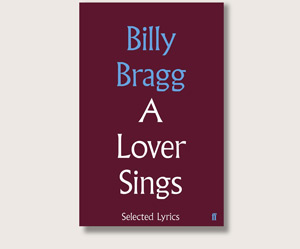 My all-time favourite Billy Bragg lyric ‘When the world falls apart some things stay in place’ is a pretty good starting point when things move, and change, with a degree of unpredictability. It’s a line from Billy’s Levi Stubbs Tears where Billy is accompanied by a superb trumpet solo from Dave Robinson. A Lover Sings contains the lyrics to this song, plus a host of others personally selected by Billy, for those of us of a certain age, and politics, they tell us the story of the past thirty years and in line after superb line provide us with a hope and a vision for the next thirty too.
My all-time favourite Billy Bragg lyric ‘When the world falls apart some things stay in place’ is a pretty good starting point when things move, and change, with a degree of unpredictability. It’s a line from Billy’s Levi Stubbs Tears where Billy is accompanied by a superb trumpet solo from Dave Robinson. A Lover Sings contains the lyrics to this song, plus a host of others personally selected by Billy, for those of us of a certain age, and politics, they tell us the story of the past thirty years and in line after superb line provide us with a hope and a vision for the next thirty too.
Looking back to find a way forward can trap us in a certain kind of conservatism.My next two choices for 2016 are a pair of books that challenge this in the way they address the past. Eric Hazan uses a single instrument of resistance and rebellion to produce a unique history of the processes of social change in A History of The Barricade. Kate Evans has produced a graphic biography Red Rosa to bring the life, times and ideas of Rosa Luxemburg alive in a vivid and striking manner text alone will never match for impact and engagement.
One of the more pleasant surprises of 2015 was the failure of UKiP to stage any kind of electoral breakthrough and in particular Farage not being elected an MP for the embarassingly umpteenth time. Though the former was principally down to the rotten electoral system we are lumbered with on the basis of the scale of the votes they did attract in coming second, third or fourth in constituency after constituency they certainly merit more than just the one MP, like it or not. Matthew Goodwin and Caitlin Milazzo meticulously map UKiP’s politics and appeal in their book UKiP : Inside the Campaign to Redraw the Map of British Politics essential reading ahead of the Euro Referendum in which UKiP will no doubt feature strongly. My prediction? SNP win overall majority in May Scottish Parliament Elections then campaigns successfully for yes vote in Scotland to stay in EU. England votes to leave. The Union is finished, UKiP reinvents itself as the English Independence Party leaving Tories hopelessly divided over whether to save the Union or exit the EU.
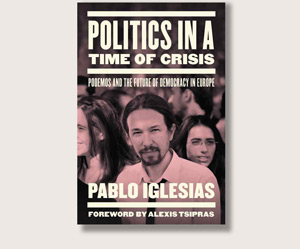 Syriza began the 2015 political year. Podemos more or less ended it. The latter is looking increasingly likely to be of the more lasting political significance. Not only by breaking Spain’s own version of the two-party duopoly but in transforming how politics is done. Podemos combine a politics of populism with a party culture of popular participation. Pablo Iglesias sets out the scale of his vision in Politics in a Time of Crisis, if Corbynite Labour is to mean anything it will need to conjure up something similar, to transform what was an increasingly moribund party into a social movement. The 2016 clock is already ticking on that one.
Syriza began the 2015 political year. Podemos more or less ended it. The latter is looking increasingly likely to be of the more lasting political significance. Not only by breaking Spain’s own version of the two-party duopoly but in transforming how politics is done. Podemos combine a politics of populism with a party culture of popular participation. Pablo Iglesias sets out the scale of his vision in Politics in a Time of Crisis, if Corbynite Labour is to mean anything it will need to conjure up something similar, to transform what was an increasingly moribund party into a social movement. The 2016 clock is already ticking on that one.
The era of the protest song began in 2015 to show some signs of a return, a subject I will return to in a future, musical, review. But for now most signs of a revolution in sound remain firmly located in a more distant past. It is a subject the author Jon Savage is superbly well-equipped to address as he proves in his splendid new book 1966 : The Year the Decade Exploded which details twelve months of CND, Vietnam, Warhol , Motown and The Beatles.
One of the characteristics of the musical movements that Jon Savage records was their global appeal, and this all pre Web 2.0. English culture remains despite the revolution in information technology naturally inward-looking. The project of the always brilliant Pushkin Press via the translation of the very best in modern European Literature for an Anglo –audience. My pick of their bunch from 2015 isthe Spanish writer Iván Repila’s allegorical novel The Boy Who Stole Attila’s Horse. Human desperation vs the necessity of hope, told via fairytale, this is big picture writing at it’s most imaginative and unpredictable.
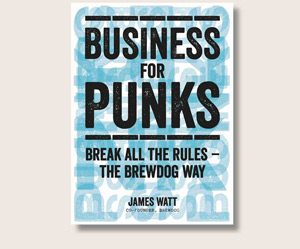 A business book may appear at first sight a strange choice to include in my top ten for 2016 political books but then as a co-founder of self-styled ‘sportingoutfitters of intellectual distinction’ I’ve found on more than a few occasions such texts provide just the kind of organisational acumen conventional politics so sorely lacks. And my choice is no ordinary business book either, cult beer label James Watt’s Business for Punks. Whether or not you are part of that happy band who combine commercial ambition with political principle this is a hugely educational book on how to get organised for change. Real ale was for a period in the 1980s one way to define a counter-culture, today the same can be said of craft beer. This is the book to read and find out why.
A business book may appear at first sight a strange choice to include in my top ten for 2016 political books but then as a co-founder of self-styled ‘sportingoutfitters of intellectual distinction’ I’ve found on more than a few occasions such texts provide just the kind of organisational acumen conventional politics so sorely lacks. And my choice is no ordinary business book either, cult beer label James Watt’s Business for Punks. Whether or not you are part of that happy band who combine commercial ambition with political principle this is a hugely educational book on how to get organised for change. Real ale was for a period in the 1980s one way to define a counter-culture, today the same can be said of craft beer. This is the book to read and find out why.
Alongside craft beer all things culinary in 2015 continued to dominate the terrain of popular culture. It’s a space where the political is typically absent yet absolutely necessary. This has become a kind of peculiar obsession of mine, why doesn’t the Left take what it eats more seriously when a huge chunk of the population seems absolutely transfixed by the subject. What if this was to change in 2016? For a textbook version of the creativity of utilitarian cooking look no further than the latest in Leon's series of cookery books Leon : Family & Friends by Kay Plunkett-Hogge and John Vincent.
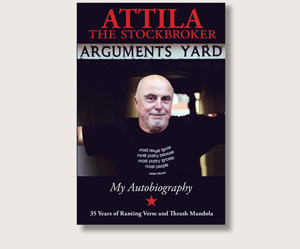 My number one choice of book to read in 2016 effortlessly mixes politics, punk, poetry, football and beer and it is because he makes that combination so much fun that Attila the Stockbroker’s autobiography Arguments Yard is such a compelling story. Those who trample the past in their headlong rush to find the new won’t give such a book more than a second glance, writing off the 35 years Attila has spent helping to establish a radical culture of live poetry and ranting rebellion. That will be their loss, don’t let it be ours. A book to read, a mission to sign up for, a practice to learn from. A truly wonderful piece of writing, thanks Attila.
My number one choice of book to read in 2016 effortlessly mixes politics, punk, poetry, football and beer and it is because he makes that combination so much fun that Attila the Stockbroker’s autobiography Arguments Yard is such a compelling story. Those who trample the past in their headlong rush to find the new won’t give such a book more than a second glance, writing off the 35 years Attila has spent helping to establish a radical culture of live poetry and ranting rebellion. That will be their loss, don’t let it be ours. A book to read, a mission to sign up for, a practice to learn from. A truly wonderful piece of writing, thanks Attila.
Note : No links in this review are to Amazon, if you can avoid buying from the tax-dodgers please do
Mark Perryman is the co-founder of the self-styled ‘sporting outfitters of intellectual distinction’ aka Philosophy Football. His new new book 1966 and Not All That is published in May.
- The Death of Innocence
27.12.25 - Thatcherism Today
04.10.25 - Top Ten Books to Understand Labour Conference
26.09.25
